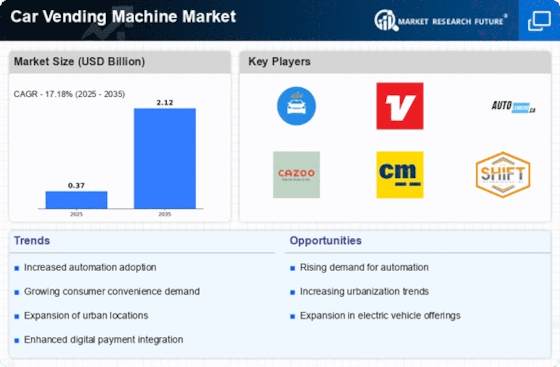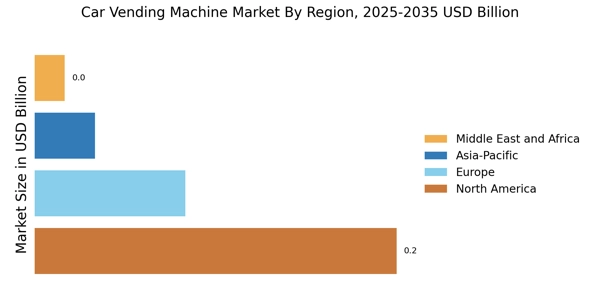Urbanization Trends
Urbanization is a driving force behind the growth of the Car Vending Machine Market. As more individuals migrate to urban areas, the demand for efficient transportation solutions rises. Car vending machines offer a unique solution to urban dwellers who may lack the space for traditional car ownership. The convenience of accessing vehicles on-demand aligns with the fast-paced lifestyle of city residents. Market analysis shows that urban areas are projected to account for over 70% of car sales by 2026, indicating a robust opportunity for the Car Vending Machine Market to thrive in densely populated regions.
Sustainability Initiatives
The Car Vending Machine Market is increasingly influenced by sustainability initiatives as consumers become more environmentally conscious. The demand for electric vehicles is on the rise, and car vending machines are adapting to this trend by incorporating electric vehicle options. This shift not only meets consumer expectations but also aligns with global efforts to reduce carbon emissions. Market data suggests that electric vehicle sales are expected to grow by 30% annually, providing a significant opportunity for the Car Vending Machine Market to promote eco-friendly options. By embracing sustainability, the industry can enhance its brand image and attract a broader customer base.
Technological Advancements
The Car Vending Machine Market is experiencing a surge in technological advancements that enhance user experience and operational efficiency. Innovations such as artificial intelligence and machine learning are being integrated into vending machines, allowing for personalized customer interactions and improved inventory management. For instance, predictive analytics can optimize stock levels based on consumer behavior, potentially reducing operational costs by up to 20%. Furthermore, the incorporation of mobile applications facilitates seamless transactions, making the purchasing process more convenient. As technology continues to evolve, the Car Vending Machine Market is likely to see increased adoption rates, as consumers gravitate towards automated solutions that offer speed and efficiency.
Investment in Infrastructure
Investment in infrastructure is a crucial driver for the Car Vending Machine Market. As cities expand and modernize, the need for innovative vehicle distribution methods becomes apparent. Governments and private investors are increasingly funding projects that support the installation of car vending machines in strategic locations. This trend is likely to enhance accessibility and convenience for consumers, thereby boosting sales. Recent reports indicate that infrastructure investments in urban areas are projected to increase by 25% over the next five years, which could significantly benefit the Car Vending Machine Market by facilitating greater market penetration and visibility.
Changing Consumer Preferences
In recent years, consumer preferences have shifted towards more convenient and efficient purchasing methods, significantly impacting the Car Vending Machine Market. The rise of e-commerce has conditioned consumers to expect quick and hassle-free transactions. As a result, car vending machines, which allow for instant vehicle selection and purchase, are becoming increasingly appealing. Market data indicates that approximately 60% of consumers prefer automated purchasing options over traditional dealership experiences. This trend suggests that the Car Vending Machine Market is well-positioned to capitalize on evolving consumer expectations, potentially leading to a substantial increase in market share.


















